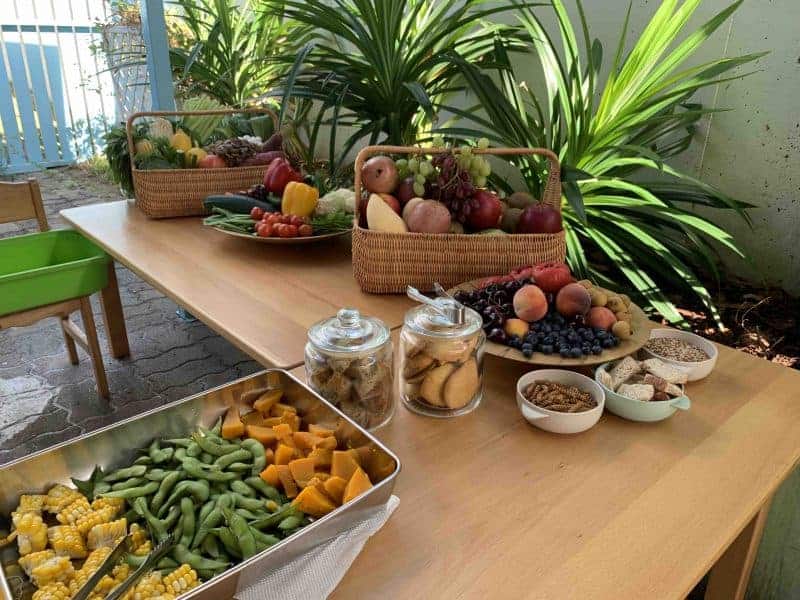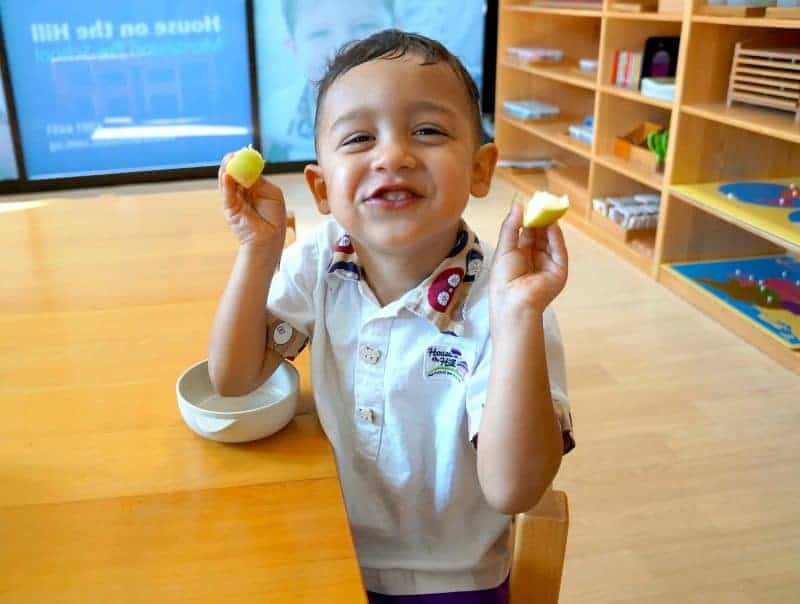One of the biggest milestones in your child’s life will be their first solid food, an exciting beginning to a lifetime of flavors and textures for your child. But it could also be the beginning of a lot of stress for you! Fussy eaters, concerns about nutrition and health can all follow in the first few years of your child’s life.
That is why we were delighted to have Dr. Natalie Epton, specialist Paediatrician and Neonatologist, to join us at House on the Hill and give advice, encouragement and guidance to parents. Here are her answers to a few parents’ questions:
On Picky Eaters

Q: My child doesn’t eat vegetables! How can I interest a toddler in eating green leafy vegetables daily?
Sometimes as parents we pass our own food prejudice onto our children, especially with vegetables. We expect them not to like brussel sprouts, olives, or other flavors because we don’t. The first thing we can do about picky eating is to present all food with equal enthusiasm!
Relatedly, we should eat what our child eats. If the food is too boring for us, it might be for them, too. Add cumin to roasted carrots, or make a spinach risotto that you like, too! When your child sees you enjoying the meal they will be more curious to try it as well.
Try new presentation for vegetables. Adding colorful vegetables chopped finely to rice makes for an attractive meal.
Q: My son has always been a fussy eater. Eating for him is a chore or a waste of time and he would much rather play than spend one minute sitting in one place to eat. I want to know ways to change his relationship with food and encourage him to be an independent eater interested in nutritious food.
We often feed children alone at the table, forgetting that all humans are social eaters. It is very important to eat with your child every night (and to eat the same meal!). Even if you plan to have dinner once your child has gone to bed, you can eat a small portion with them first. Mealtimes can also be made fun! As you sit together, talk about your day, ask about their day, and engage.
Secondly, if they absolutely refuse to eat the meal or only eat a little bit, don’t reward a failed mealtime with a treat (even a healthy treat like yogurt), and don’t prepare a different option. Though they may be hungry at first, they will quickly learn that they must eat what is prepared for them during the mealtime.
HotH tip: having your children help in the preparation of the meal can pique their interest in the final product. Ask them for help cooking the meal and they’ll be so proud they won’t be able to stop themselves from eating their creation!
On Eating Vegetables

Q: Robin has been more adventurous with flavours since starting school and generally eats quite well. I have been trying to get her to eat more vegetables and fruits but she mostly plays with them and does not eat them. I would like to know how to encourage her to eat more vegetables.
Playing with your food does not always have to be a bad thing! Consider letting her “play” by dipping cut vegetable sticks into healthy dips. Carrots, capsicum, steamed broccoli, or cucumbers make great sticks, and you can offer guacamole (pureed avocado) or hummus (pureed chickpeas) to dip into.
Also, if you’ll be introducing a new food at lunch time, do yourself and your child a favor and make dinner a “safe meal” that you know they will enjoy!
Q: My child refuses almost all vegetables but likes many kinds of fruits. Can fruits provide similar nutrients as vegetables?
It is great they are eating fruit! Good job! But unfortunately, we need a variety of fruits and vegetables to cover all of our nutritional needs. Without vegetables we may be missing out on key suppliers of fiber, iron, calcium, folate, and vitamin A. Additionally, fruits have a lot more sugar than vegetables!
To help your child eat more vegetables consider introducing some ‘bridge veggies’. If your child likes fruits, start with vegetables that are similar, like cherry tomatoes and cut cucumbers. These are sweet and more similar to fruits she likes, and may help transition her into more vegetables.
On Healthy Eating Habits

Q: My child does not like meat or vegetables, and we can only get him to eat when he is distracted with TV shows or the iPad.
This is quite common, unfortunately. My advice is to quit cold turkey with the distractions, because if you don’t, it will only escalate and soon you’ll have to provide Peppa Pig at every meal!!
Stop with the distractions, and instead begin with the habits you would like to see. Sit together as a family (put your phone away, too!) to eat dinner and model healthy habits. If they don’t eat this meal, don’t reward it with another option or food they like; soon they will learn to eat what is provided during mealtimes without a screen to distract them.
Q: My child only drinks apple juice and loves sweets. I’m worried about his health!
Juice (and other packaged foods like purees) can unfortunately hide a lot of sugar, even if it is labeled as “organic” or “natural”. If you’re going to serve juice I recommend diluting it: 1 part juice to 4 parts water. You should only serve it as meal times, when the food can help to wash away the sugar from the teeth. Diluting it will also make it less sweet and can help to transition your child away from it.








